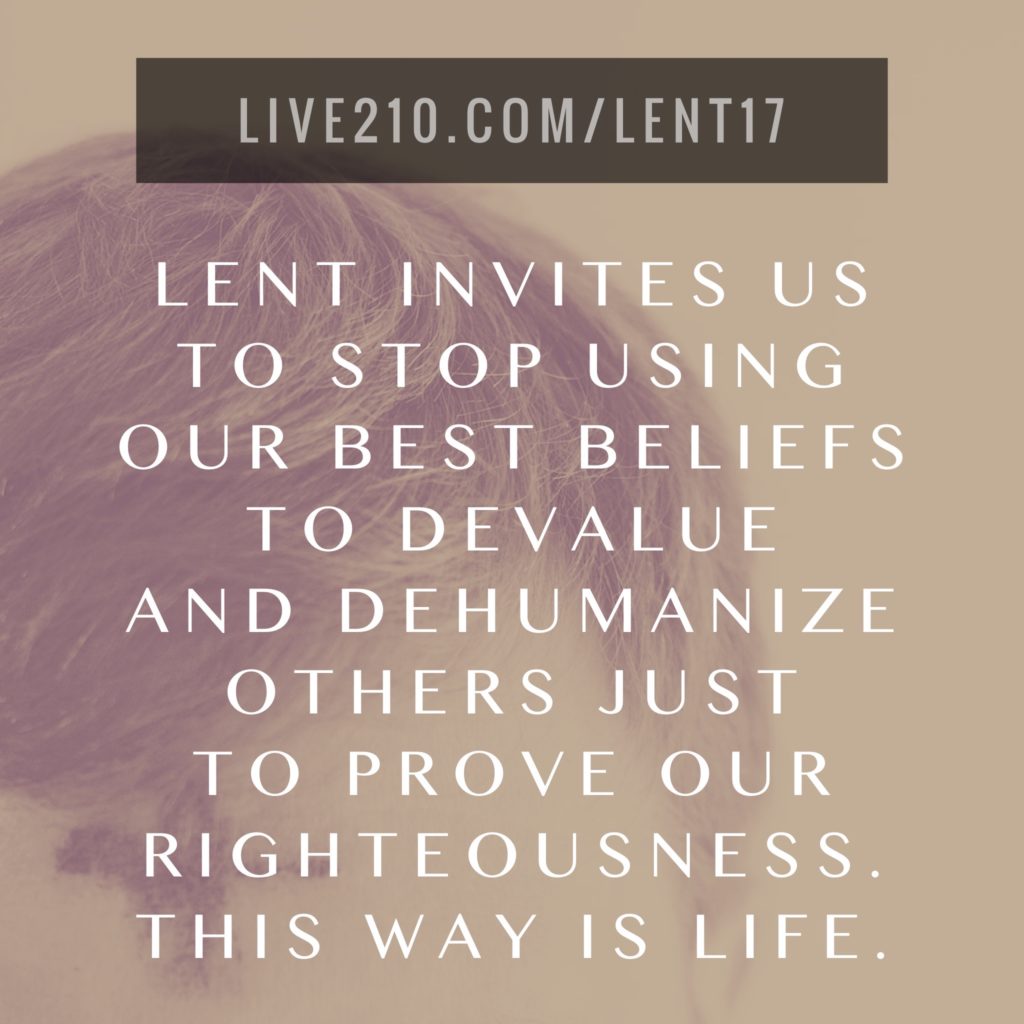5 min. to read.
It’s the 17th day of Lent. Luke 18:9-14 is today’s scripture, a parable that warns against using prayer and spiritual practice in a very destructive way.
Two men head down to the temple to pray, Jesus tells us. One of them was a notably religious person, spiritually devout, with a deep love for our way of life. The other was widely seen as a sinner, blasphemer, and collaborator with those who hate our country. Both men prayed.
The religious person’s prayer was oddly about himself. “I am so grateful,” he prayed… What was he grateful for? The privilege and position God has given him? The presence of God in his life? The opportunities he had to serve? None of that. He was grateful that God hadn’t fated him to be like certain other people: “Thieves, Rogues, Adulterers, or even, this tax collector.” Unlike those cast-outs, the religious person was a regular and sacrificial donor, which he noted in his prayer. He even went above and beyond in his spiritual practices! (Which he also noted).
The other man, agreed by all to be a sinner, was indeed a tax collector. Although he had gone down to the temple to pray, he stood “at a distance.” He knew the religious crowd didn’t really welcome or include him. His prayer was short and straightforward. “God, be merciful to me, a sinner.”
Jesus ends this odd little story by telling his listeners that, perhaps to the surprise of some, it was the tax collector who ended his prayer in good standing with God. God did not need to bother justifying the religious person. After all, they had spent the whole prayer justifying themselves.

The issue, of course, is how we so often see others in ways that justify and elevate our own rightness. This is the evil seed at the heart of every kind of purity culture. Name an ideological group, and there is a “purity culture” within it. We get this label from the self-proclaimed Evangelical Christian sexual purity culture, but the dynamics cross into every group that thinks it has a “better way.” Progressive Christian deconstruction culture, secular intersectional activist culture, and the ardent community of political partisans, whether they wear a D or an R, all struggle with this toxic weed.
Ideological communities form because they believe they have a clear idea of what leads to a better life. Their ideas may be good. They may be rooted in a desire to alleviate harm or protect. In their desire to pursue this end, they notice that certain ideas, actions, even words run the risk of causing harm. Then the evil seed blooms.
What may have begun as a thoughtful desire to protect from harm ends up mutating into a list of acceptable behaviors, words, even thoughts. Knowing this list and adhering to it becomes a sure way to know we are on the side of righteousness. Seeing others violate the list elevates our status as people who know what’s right. Some transgress out of ignorance (the sheeple, the unconverted, the uninformed). Others violate our standards intentionally (the trolls, the deplorable, the wicked.) Noticing those violations (“Aha, I know the list!”) and calling them out (“See how courageous and committed I am!”) validates our status as zealous for righteousness. We are certainly members of The Group!
What began as a belief in something that would protect, alleviate harm, or draw people closer to God, becomes an identity marker we must defend at all costs. Truly the human heart can turn any good thing into self-justification.
It’s interesting to note the kind of awareness present in each prayer from Jesus’ story. The religious person was addressing God, but their prayer seemed mainly aware of others. The prayer itself appeared a form of comparing and competing. In contrast, the prayer of the man everyone agreed was a sinner seemed only aware of himself and God. Even then, his self-awareness was of his own weakness.
I find myself vacillating between these two characters. Some days my inner life is bursting with the toxic gasses of comparison and competition. I should be further along in life than I am. Why didn’t my book sell as much as that person’s book? I can’t believe those Christians think those absurd and offensive thoughts. (See how much more spiritual and evolved I am!) Other days, I can’t see those things at all, and I don’t want to. I am overwhelmed with my weakness, my grief, my inability to change the world. It’s all I can do just to breathe out the name of God, hoping, trusting that God is there and at work.
In this simple parable, Jesus warns us away from comparison and competition, the inevitable trap of self-justification that lies at the door for any one of us who believes deeply in a better way of life. He tells us that God is near to the broken-hearted and present with those who know themselves as weak. That’s exactly where I want to be.
Lent invites us to stop using our best beliefs and commitments to devalue and dehumanize others just to prove our righteousness. This way is life.
